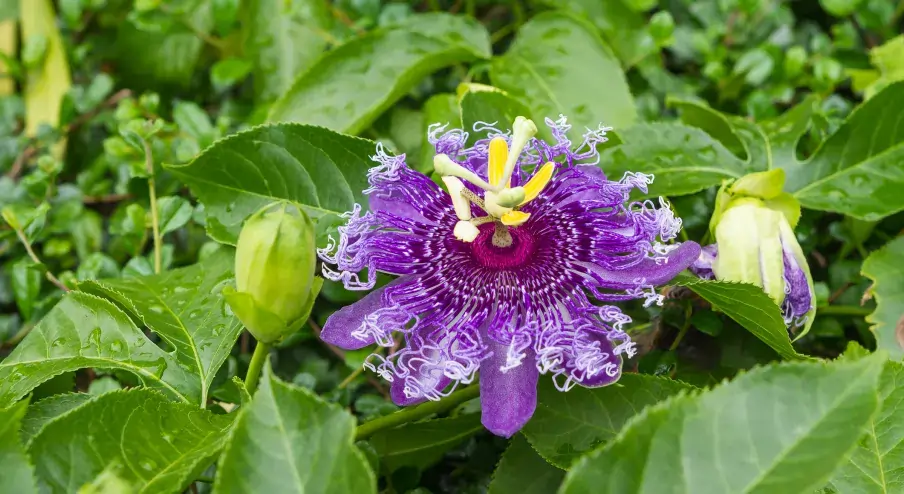Passionflower, botanically identified as Passiflora, is a climbing vine celebrated for its stunning and elaborate blooms. Originating from the Americas, this plant boasts a rich history in herbal medicine.
Renowned for its soothing properties, passionflower has become a cherished natural remedy for addressing stress, anxiety, and insomnia.
The Historical Journey of Passionflower
Passionflower came to prominence in the 16th century when Spanish explorers encountered it in South America. Its intricate design reminded them of Christ’s Passion, inspiring its name. Indigenous communities harnessed its medicinal value, and it continues to be a cornerstone of herbal remedies across the globe.
Aesthetic Appeal of Passionflower
Beyond its therapeutic benefits, passionflower is a botanical wonder. Its blossoms showcase an eye-catching blend of white, purple, and blue shades, creating a unique structure that distinguishes it from other plants.
Nutritional Powerhouse of Passionflower
This plant contains various beneficial compounds, including flavonoids, alkaloids, and phenolic substances. These elements are celebrated for their antioxidant and calming effects, contributing to passionflower’s wide-ranging health advantages.
Key Health Benefits of Passionflower
- Naturally Eases Anxiety
Passionflower is widely recognized for its anxiety-reducing capabilities. Boosting gamma-aminobutyric acid (GABA) levels in the brain helps relax the nervous system and alleviate stress. - Enhances Sleep Quality
Are you having trouble sleeping? Passionflower tea or supplements may promote more profound relaxation, paving the way for a more restful and rejuvenating night’s sleep. - Supports Cardiovascular Health
Packed with antioxidants, passionflower contributes to heart health by reducing oxidative stress and fostering better blood circulation. - Relieves Menopausal Discomfort
For menopausal women, passionflower offers relief from mood swings and hot flashes thanks to its hormone-regulating properties. - Alleviates Pain and Reduces Inflammation
Mild analgesic and anti-inflammatory qualities make passionflower helpful for managing headaches, sore muscles, and minor injuries.
Practical Uses for Passionflower
- Brewing Passionflower Tea
One of the simplest ways to enjoy passionflower is as a tea. Steep dried leaves in hot water for 10 minutes to create a calming beverage. - Incorporating Supplements
Passionflower supplements, available as capsules, tablets, or tinctures, offer a convenient method of enjoying its health benefits daily. - Topical Skincare Benefits
Passionflower extracts are used in skin care products for their calming and antioxidant properties, ideal for soothing sensitive skin.
Safety Considerations and Precautions
- Potential Side Effects
While generally safe, overuse may lead to dizziness, drowsiness, or nausea. Always adhere to recommended dosages. - Who Should Exercise Caution?
Pregnant or breastfeeding women and individuals taking sedatives or medication for anxiety or insomnia should consult a healthcare provider before use to avoid potential interactions.
Cultivating Passionflower at Home
- Optimal Growth Conditions
Passionflower thrives in sunny, warm climates with well-drained soil. It proliferates and can be trained to climb structures like fences or trellises. - Planting Techniques
Start with seeds or cuttings. Soak seeds in warm water before planting to encourage germination, and water regularly without oversaturating the soil. - Ongoing Care
Prune your passionflower to maintain its shape and encourage blooming. Use organic fertilizers to support its vigorous growth.
Cultural and Symbolic Importance
In addition to its health benefits, passionflowers have spiritual significance. They symbolize faith and spirituality, particularly in Christian traditions, where they represent the Passion of Christ.
Delicious Passionflower Recipes
- Iced Passionflower Tea
Brew a cup of passionflower tea, let it cool, and serve over ice with a lemon wedge for a refreshing twist. - Herbal Evening Infusion
Combine passionflower with chamomile, lavender, and honey for a calming and aromatic bedtime tea.
FAQs
Can passionflower be used daily?
Yes, it can be taken daily in appropriate doses, but consult your doctor for long-term use.
Does it help with depression?
While primarily known for relieving anxiety and improving sleep, it may have mild mood-stabilizing effects.
Is passionflower safe for children?
Small doses may be safe, but consult a pediatrician before use.
Is passionflower habit-forming?
No, passionflower is non-addictive and considered a natural alternative to sedative medications.
Where can I purchase Passionflower?
Passionflower is available in health food stores, online marketplaces, and pharmacies as teas, tinctures, or capsules.





One thought on “Passionflower: Unlocking Relaxation and Promoting Restful Sleep”